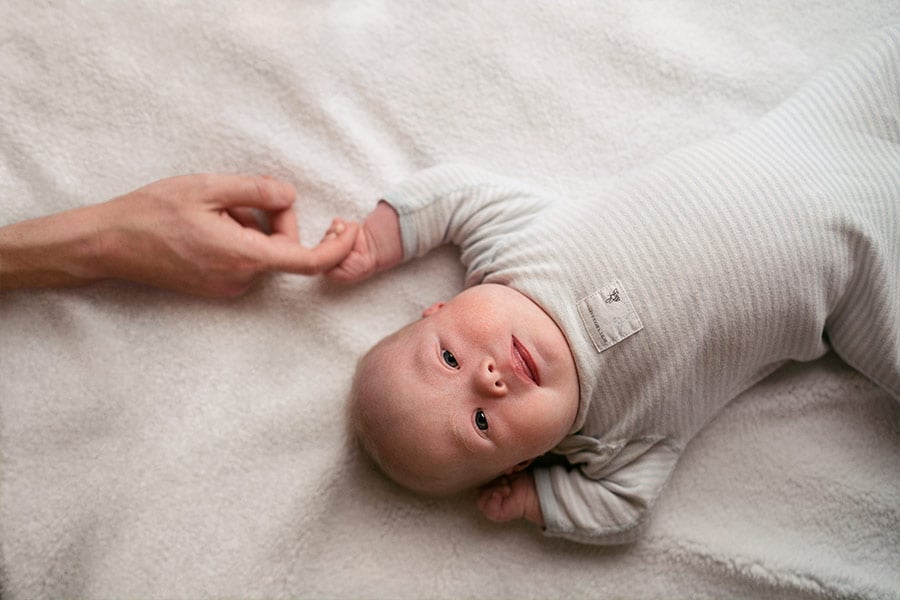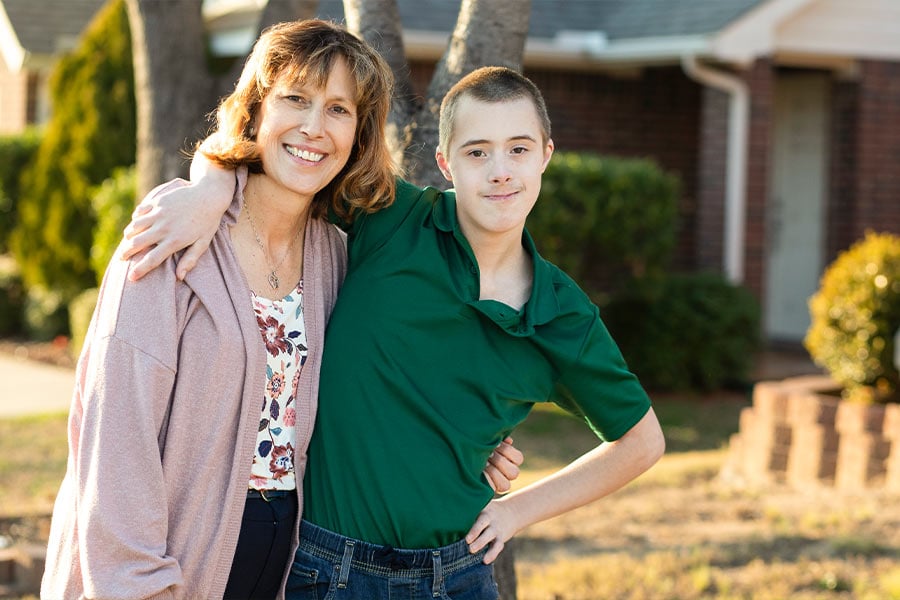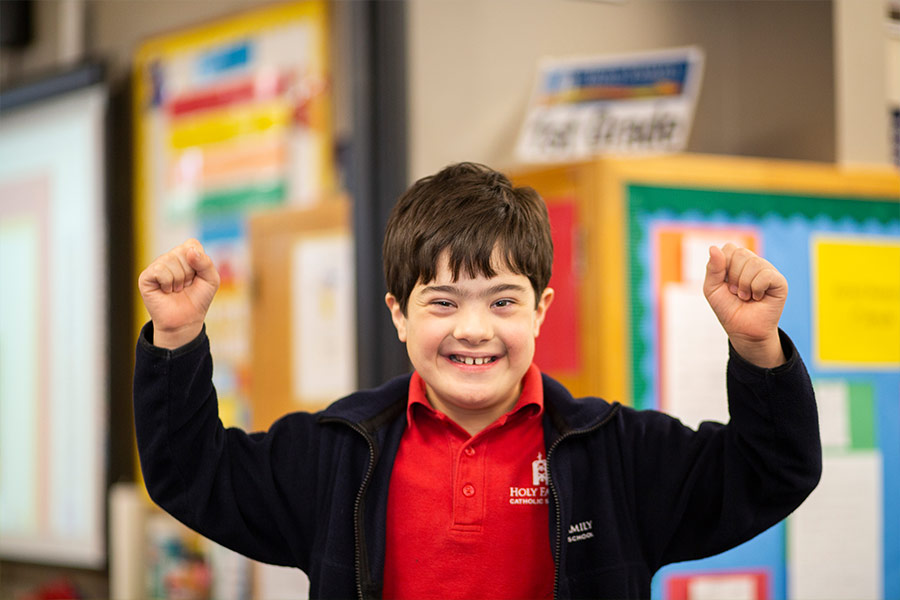Unexpected blessings - parents appreciate the love and blessings of Down syndrome children

Four-month-old Christopher Cockrell holds his father's hand after coming home from the hospital for heart surgery in January 2021. (NTC/Juan Guajardo)
“Each year the voice of people with Down syndrome, and those who live and work with them, grows louder.”
Those words, publicizing World Down Syndrome Day (WDSD), resonate with Pamela McGehee.
“Every day is Down syndrome awareness for us. It’s so much a part of our lives and our thought process,” said the mother of 24-year-old Brigid. “It’s good to raise public awareness for the rest of the world.”
Declining prenatal testing, the pro-life Catholic convert didn’t know her second daughter had Down syndrome until she was born. McGehee considers the chromosomal disorder, found in 6,000 U.S. births each year, a gift that helped her find love, faith, and lasting friendships.
“The blessings that Brigid brought to our family are innumerable,” stated the property investor, explaining how the diagnosis led to meeting her husband, Frank, and later joining the Catholic Church. In 2015, McGehee founded Our Mother of Perpetual Help Educational Program to provide a Catholic-based learning environment for children and adolescents with special needs. Finding effective schooling for Brigid inspired the venture.
“It breaks my heart every time I hear someone is terminating a pregnancy because of Down syndrome,” admitted the St. Benedict parishioner. “I can literally see all the blessings God would give to them being flushed away.”
Fostering inclusiveness, support
Officially observed by the United Nations since 2012, WDSD is always celebrated on the 21st day of the third month of the year (March 21) to draw attention to the trisomy of the 21st chromosome that causes Down syndrome. Activities, proclamations, and fundraisers are designed to create global awareness and foster a spirit of inclusiveness and support for people with the condition, also known as Trisomy 21.
The most common chromosomal abnormality diagnosed in the U.S., the disorder occurs in people of all races and economic levels and affects how a baby’s body and brain develop. Although both mental and physical challenges are present, the future of people with Down syndrome has improved dramatically over several decades with many living independent, productive lives well into adulthood.
Involved and accepted
Helping her son become a contributing member of society is a goal shared by Jeanette Gray and her husband, Scott. Born in 2005 with Down syndrome, 15-year-old Andrew is now a freshman in public high school.
“We want him to have a job he loves,” asserted Gray, a third-grade teacher at Immaculate Conception Catholic School in Denton. “Andrew is a real people person. He enjoys movies and watching his sister play volleyball. I just want him to always be involved and accepted in the community.”
Just “sailing along” after the birth of her first child, Megan, the Pittsburgh native was surprised when early tests indicated a problem with her second pregnancy. Finding out the baby had Down syndrome was distressing but didn’t compare to what happened next. More than one person recommended abortion.
“To me it really was a total shocking thing,” Gray recalled. “Educated people were willing to say it was no problem if I wanted to terminate the pregnancy.”
Abortion was never an option for the cradle Catholic who was “shocked and saddened by doctors telling me it was okay.”

Jeanette Gray and her 15-year-old son, Andrew, visit after school (NTC/Rodger Mallison)
When Andrew was born, he was just like any other newborn — beautiful.
“And I enjoyed those moments,” Gray remembered. “Sure, there have been trying times but the joy of being a mother far outweighs any of the other issues that we come across as he grows up.”
For the first few years of his life, Andrew attended St. Anthony’s Program — a curriculum for special needs students offered in the Diocese of Pittsburgh’s Catholic school system. He remained in the program until the sixth grade when his family moved to Denton.
“Andrew brings joy and humor to our life,” his mom said. “He doesn’t have down days.”
Looking beyond the diagnosis
Amy Matasso hoped to find a Catholic school that would look beyond her son’s Down syndrome and welcomes what she sees — a little boy who loves to learn. The Holy Redeemer parishioner found the answer to her prayers at Holy Family Catholic School in Fort Worth.
“Nothing is more nerve wracking than having people shutting doors before they get to know Andrew and what he’s capable of,” Matasso said matter-of-factly. “So many focus on what children with Down syndrome can’t do and not what they can do.”
At Holy Family, the teachers and principal saw only possibilities — not problems — when Andrew enrolled in the school’s kindergarten program in 2019. The eight-year-old is now in first grade and part of a school community that includes older brother, Josh, a third grader, and sister, Lorelei, a preschooler.
“The way he was accepted was just beautiful,” beamed the mother who worried how someone needing extra help would be received in the classroom. “Andrew has speech challenges, and his classmates get so excited when he uses words they can understand. He’s made special friendships.”

Andrew Matasso at Holy Family Catholic School in Fort Worth. (NTC/Rodger Mallison)
The pleasure of watching her son achieve milestones contrasts sharply with the emotional fog that descended on Matasso and her husband, Anthony, after hospital nurses noticed their newborn had physical features consistent with Down syndrome. Research and meeting with specialists filled their days for the next two years.
Facts gleaned from the internet can seem grim but advances in education and therapies are changing the outlook for children like Andrew, Matasso pointed out. More awareness could impact their future even more. According to some sources, 75 to 90 percent of children with a prenatal diagnosis of Down Syndrome are aborted.
“Parents are scared and don’t know what to do,” she sympathized. “If people met more children like Andrew, they would see the happy, independent lives they can lead. There’s so much that can be done from a developmental perspective. It’s incredible.”
Andrew deepened her family’s faith and made them more grateful for the little things in life. It also fostered compassion for the hidden struggles of other families.
“You don’t realize how many parents have a child with special needs until you’re given one,” Matasso said.
Meeting a miracle
Caring for a child with Down syndrome is a new reality for Erin and Jameson Cockerell. Born in September, their son Christopher has undergone two surgeries to repair a common heart defect found in children with Down syndrome.
The couple’s Catholic faith helps them deal with the health crisis.
“There’s been a lot of prayer and discernment on how we could be the best parents,” Erin explained. “As soon as we got the diagnosis, we wanted to give the baby a name so we could start praying for him.”
She typed “patron saint of strong men” into her computer search engine and the name Christopher popped up.
“The name means ‘Christ bearer’ so it’s perfect for him and what he’s done for our family,” added the mother of two older boys, four-year-old J.T. and two-year-old Jackson. “This whole event has just brought me to my knees. It’s been difficult but I can see Christ working in the prayers and support we’ve received.”
Jameson Cockerell admitted experiencing a range of emotions prior to Christopher’s birth. A small faith group the couple belongs to at St. Elizabeth Ann Seton Parish offered support and encouragement.
“Our plans are not what God’s plans are and that was certainly true for us,” the software specialist explained.
There’s an inherent tension that exists when hearing the words, Down syndrome.
“But the primacy of meeting the person overrides that,” he continued. “Meeting Christopher changed the whole picture because you’re face to face with a miracle.”
The St. Elizabeth Ann Seton parishioners agree life with their special needs child will be different but not diminished.
“It’s the life God wants us to have,” Erin suggested. “We’re both hopeful Christopher will help us become saints. That’s the whole point of living. He’s existed a year [from conception] and we’ve already changed so much as a family, as people, as Christians.”
